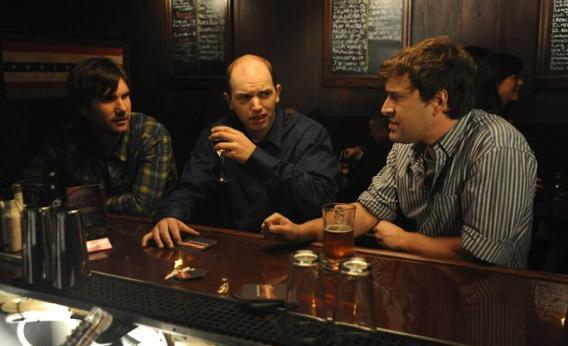Before I started watching The League (FX, Thursdays at 10:30), I understood only very vaguely how fantasy football works. Now, after having watched every episode of The League, I still understand only very vaguely how fantasy football works, but I have learned that wealthy, straight, white men really like football, sex, beer, and avoiding taking responsibility for their actions. (Who knew?)
This sounds like tired sitcom fodder because it is tired sitcom fodder, but The League is (mostly) redeemed by the fact that its boorish, despicable main characters are played by exceedingly appealing, very funny actors. Particularly excellent are Nick Kroll as Ruxin, the amoral corporate litigator whose occasional childlike grins and impromptu song-and-dance numbers warm the heart; Paul Scheer as Andre, a sweet, dorky, fad-following plastic surgeon who’s the perpetual butt of the group’s jokes; and the wonderfully rubber-faced Stephen Rannazzisi as Kevin, the husband and father who’s the heart of the show, mostly because he is the only member of the league with any semblance of a moral compass.
The congeniality of the cast leads to frequent moments of cognitive dissonance when you step back and realize how horrible their characters are. Exhibit A is the fact that the all-white, almost-all-male league named its yearly trophy “the Shiva,” after a dorky Indian-American woman they knew and made fun of in high school. The woman’s high-school yearbook photo adorns the cup, and the lads often chant or yell her full name—Shivakamini Somakandarkram—at moments of peak anger or joy.
The show has sought to soften the blatant grossness of the trophy over the seasons—by reintroducing Shiva, now a sexy, successful doctor; by briefly changing the name of the trophy to “the Andre”—but it’s never backed down from it. Shiva the person, played engagingly by Janina Gavankar, under-reacted when she found out that the trophy bore her image in Season 1; she’s returned periodically since then so that the show can absolve itself of wrongdoing by reminding us that she hasn’t been scarred at all by the leagues’ stalkerish bullying.
The universe of the show is littered with female stereotypes: dumb blondes, angry black women, gold-diggers, cougars, emasculating girlfriends. Pete once dated a girl who broke his penis during sex—no unflattering portrayal of women, not even the vagina dentata myth, goes unexplored on The League. In the new season, Kevin’s brother Taco (Jon Lajoie) agrees to “trade” the attractive woman he’s dating for one of Pete’s wide receivers.
The only women in the league itself is Jenny (Katie Aselton), Kevin’s wife, who joined in Season 2. Last season, Kevin told Jenny that she “is not a girl,” and he meant this as a compliment. Jenny likes football, sex, beer, and weed. She’s cool with porn and rape jokes, too; in general, she doesn’t seem to like other women very much, judging from her catty interactions with Ruxin’s sexy wife and her apparent lack of female friends. Unsurprisingly, Jenny’s the most underdeveloped character of the regulars; it was only last season that we learned what she does for a living. Instead of giving her idiosyncratic traits, the writers are content to distinguish Jenny from the other league members by her genitalia.
Is a lack of realistic female characters a good reason not to watch a sitcom? What if the sitcom frequently makes you laugh out loud? Season 4 of The League promises both more sexism and more genuine laughs. In the first episode, Taco begins delivering difficult messages via singing cowboy (funny), and Jenny fantasizes about making out with Shiva (icky). A recurring gag in Episode 2 draws a cuter-than-it-sounds parallel between hoodies and foreskins, and Episode 3, delightfully, sees the return of the brilliant Jason Mantzoukas as Rafi, Ruxin’s brother-in-law. Sexist, violent, and sociopathic, Rafi is the most loutish sitcom lout of all time, and Mantzoukas’ every line is a legitimately shocking, legitimately hilarious gem.
And that is what makes The League both endearing and confusing. The League invites us to laugh at Rafi, not with him, because it’s clear that his misogyny and boorishness make him a terrible person. And yet Rafi exists only a few notches down the same spectrum of behavior as Pete, Ruxin, Kevin, Taco, Andre, and Jenny. The League takes its premise from a generation of sitcoms that trade on gender stereotypes, yet it’s clear its writers recognize how stupid those stereotypes can be. The writing is good enough to make me want to keep watching. And the acting is good enough to make me keep hoping against hope that The League’s protagonists will turn out to be better people than they are.
